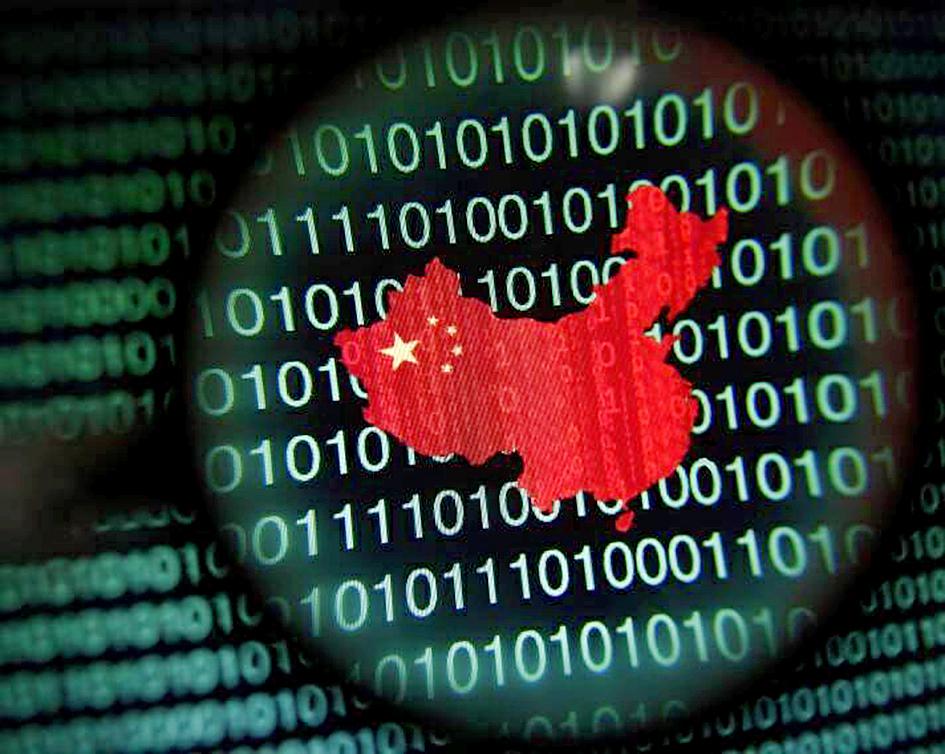The government has banned the use of Chinese information and communications products at all agencies as they could compromise Taiwan’s cybersecurity, the Ministry of National Defense said in a report presented yesterday at a meeting of the legislature’s Judiciary and Organic Laws and Statutes Committee.
Drones manufactured by Shenzhen-based DJI Technology Co (大疆創新) are capable of gathering private information from their users, as well as government agencies, the report said, citing a 2017 US Department of Homeland Security report.
News reports have said that products made by Huawei Technologies Co (華為) and its affiliate HiSilicon Technologies Co (海思半導體) are able to transmit user data back to the firms’ servers in China or use malware to take control of a user’s Web camera, the report said.

Photo: Reuters
“We have banned the use of Chinese information and communications products as they have been assessed and risk endangering national security,” it said.
The Military Information Asset Management Operational Regulations ban the ministry from procuring devices made in China that can send data via the Internet, it added.
In December 2020, the Executive Yuan began prohibiting the use of Chinese information and communications products by government agencies, including software, hardware and services, the report said.
Any procurement of products and services at the defense ministry must follow the guidelines and be inspected by an internal review department before procurement is complete, it said.
“In addition to the certificate of origin, agencies under the defense ministry must dissemble the devices to check if they contain Chinese-made components. Networks used by the military are regularly inspected to identify potential information security risks,” the report said.
The National Security Bureau said in a report that Lithuania, Belgium and other countries have over the past few years stated how Chinese smartphones can be used to illegally gather user information.
To safeguard national security, the US Federal Communications Commission banned the use of communications and surveillance products made by several Chinese companies, including Huawei, ZTE Corp (中興), Hangzhou Hikvision Digital Technology Co (杭州海康威視數字技術), Zhejiang Dahua Technology Co (浙江大華科技) and Shegzhen-based Hytera Communications Corp (海能達通訊), the bureau said.
During US House of Representatives Speaker Nancy Pelosi’s visit to Taiwan in August, electronic advertisement boards in convenience stores and in the Taiwan Railways Administration’s Sintsoying Station were hacked to display messages critical of the visit, it said, adding that both used software made in China.
“We also found that Chinese information and communications products must link to their servers in China to update the operating systems. Beijing, on the other hand, can ask companies to hand over information of certain users or help it gather intelligence based on its National Intelligence Law and Cybersecurity Law,” it said, adding that these functions have threatened Taiwan’s information security.

The first two F-16V Bock 70 jets purchased from the US are expected to arrive in Taiwan around Double Ten National Day, which is on Oct. 10, a military source said yesterday. Of the 66 F-16V Block 70 jets purchased from the US, the first completed production in March, the source said, adding that since then three jets have been produced per month. Although there were reports of engine defects, the issue has been resolved, they said. After the jets arrive in Taiwan, they must first pass testing by the air force before they would officially become Taiwan’s property, they said. The air force

The Coast Guard Administration (CGA) yesterday said it had deployed patrol vessels to expel a China Coast Guard ship and a Chinese fishing boat near Pratas Island (Dongsha Island, 東沙群島) in the South China Sea. The China Coast Guard vessel was 28 nautical miles (52km) northeast of Pratas at 6:15am on Thursday, approaching the island’s restricted waters, which extend 24 nautical miles from its shoreline, the CGA’s Dongsha-Nansha Branch said in a statement. The Tainan, a 2,000-tonne cutter, was deployed by the CGA to shadow the Chinese ship, which left the area at 2:39pm on Friday, the statement said. At 6:31pm on Friday,

The Chinese People’s Liberation Army Navy’s (PLAN) third aircraft carrier, the Fujian, would pose a steep challenge to Taiwan’s ability to defend itself against a full-scale invasion, a defense expert said yesterday. Institute of National Defense and Security Research analyst Chieh Chung (揭仲) made the comment hours after the PLAN confirmed the carrier recently passed through the Taiwan Strait to conduct “scientific research tests and training missions” in the South China Sea. China has two carriers in operation — the Liaoning and the Shandong — with the Fujian undergoing sea trials. Although the PLAN needs time to train the Fujian’s air wing and

STRIKE: Some travel agencies in Taiwan said that they were aware of the situation in South Korea, and that group tours to the country were proceeding as planned A planned strike by airport personnel in South Korea has not affected group tours to the country from Taiwan, travel agencies said yesterday. They added that they were closely monitoring the situation. Personnel at 15 airports, including Seoul’s Incheon and Gimpo airports, are to go on strike. They announced at a news conference on Tuesday that the strike would begin on Friday next week and continue until the Mid-Autumn Festival next month. Some travel agencies in Taiwan, including Cola Tour, Lion Travel, SET Tour and ezTravel, said that they were aware of the situation in South Korea, and that group